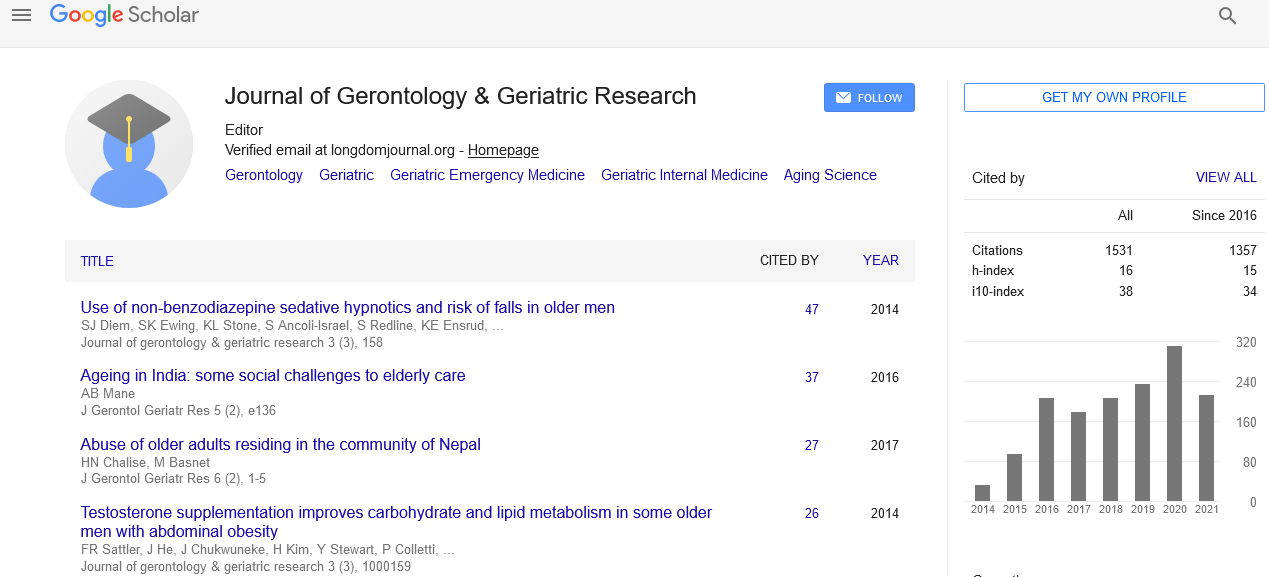PMC/PubMed Indexed Articles
Indexed In
- Open J Gate
- Genamics JournalSeek
- SafetyLit
- RefSeek
- Hamdard University
- EBSCO A-Z
- OCLC- WorldCat
- Publons
- Geneva Foundation for Medical Education and Research
- Euro Pub
- Google Scholar
Useful Links
Share This Page
Journal Flyer

Open Access Journals
- Agri and Aquaculture
- Biochemistry
- Bioinformatics & Systems Biology
- Business & Management
- Chemistry
- Clinical Sciences
- Engineering
- Food & Nutrition
- General Science
- Genetics & Molecular Biology
- Immunology & Microbiology
- Medical Sciences
- Neuroscience & Psychology
- Nursing & Health Care
- Pharmaceutical Sciences
Noninvasive intranasal stem cells and other therapeutic cells bypass the blood-brain barrier to target the CNS to treat Parkinson's disease, stroke, neonatal ischemia, hemorrhage, multiple sclerosis, brain tumors, TBI, Alzheimer's and other CNS disorders
2nd International Conference on Geriatrics & Gerontology
August 24-26, 2015 Toronto, Canada
William H Frey
University of Minnesota, US
Posters-Accepted Abstracts: J Gerontol Geriat Res
Abstract:
Together with my collaborators in Germany, especially Lusine Danielyan MD, we discovered and patented that therapeutic cells, including adult stem cells and genetically-engineered cells, can be non-invasively delivered to the brain using the noninvasive intranasal delivery method that I developed. The first of our scientific papers on this new discovery describes this successful method of delivery and proprietary formulations that enhance the delivery. The second of our papers describes the successful treatment of Parkinson's disease in an animal model with intranasal adult bone marrow derived mesenchymal stem cells. Intranasal stem cells bypass the blood-brain barrier to target the brain by traveling extracellularly along the olfactory neural pathway with minimal delivery to other organs. Once in the brain, adult stem cells target the damaged areas of the brain, specifically to treat the underlying disease. Researchers at University Medical Center Utrecht in the Netherlands have demonstrated the effectiveness of intranasal stem cell treatment technology in an animal model of neonatal cerebral ischemia and also in animals with neonatal brain damage and subarachnoid hemorrhage. Researchers at Emory University have used our intranasal stem cell treatment successfully in an animal model of stroke, and researchers at Uppsala University in Sweden have demonstrated that intranasal T regulatory cell therapy delivered and targeted the cells to the brain and efficiently suppressed ongoing inflammation in an EAE model of multiple sclerosis leading to reduced disease symptoms. Intranasal adult neural stem cells have also been shown to improve the EAE model of MS as having intranasal mesenchymal stromal cells. Other researchers have reported that intranasal stem cells target and treat brain tumors. This intranasal delivery, targeting and treatment technology can make stem cell treatments, practical for CNS disorders by eliminating the need for invasive neurosurgical implantation of cells and by eliminating the need for intravenous delivery that disperses cells throughout the body resulting in an unwanted systemic exposure. This delivery and treatment method can facilitate the development of stem cell and genetically-engineered cell therapies for Parkinson`s, PSP, Huntington's, Alzheimer`s, MS, stroke, neonatal ischemia, brain tumors, Traumatic Brain Injury (TBI), Spinal Cord (SCI) Injury, etc. This non-invasive delivery, targeting and treatment technology is available for licensing worldwide.
Biography :
Email: alzheimr@umn.edu


